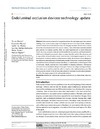Identificador persistente para citar o vincular este elemento:
https://accedacris.ulpgc.es/jspui/handle/10553/74278
| Título: | Endoluminal occlusion devices: technology update | Autores/as: | Zander, Tobias Medina, Samantha Montes, Guillermo Nuñez-Atahualpa, Lourdes Valdes, Michel Maynar Moliner, Manuel |
Clasificación UNESCO: | 3213 Cirugía 3314 Tecnología médica |
Palabras clave: | Embolization Endovascular Treatment Occlusion Devices Hemorrhage Aneurysm, et al. |
Fecha de publicación: | 2014 | Publicación seriada: | Medical Devices: Evidence and Research | Resumen: | Endoluminal occlusion has been performed since the early beginning of interventional radiology. Over recent decades, major technological advances have improved the techniques used and different devices have been developed for changing conditions. Most of these occlusion devices have been implemented in the vascular territory. Early embolization materials included glass particles, hot contrast, paraffin, fibrin, and tissue fragments such as muscle fibers and blood clots; today, occlusion materials include metallic devices, particles, and liquid materials, which can be indicated for proximal or distal occlusion, high-flow and low-flow situations, and in large-caliber and small-caliber vessels, based on need. Technological progress has led to a decreased size of delivery catheters, and an increase in safety due to release systems that permit the withdrawing and replacement of embolization material. Furthermore, bioactive embolization materials have been developed to increase the efficacy of embolization or the biological effect of medication. Finally, materials have been modified for changing indications. Intravascular stents were initially developed to keep an artery open; however, by adding a covering membrane, these stents can be used to occlude the wall of a vessel or other endoluminal structures. This article gives an overview of the devices most utilized for occlusion of endoluminal structures, as well as their major purpose in the endovascular territory. | URI: | https://accedacris.ulpgc.es/handle/10553/74278 | ISSN: | 1179-1470 | DOI: | 10.2147/MDER.S49540 | Fuente: | Medical Devices-Evidence And Research [ISSN 1179-1470], v. 7, p. 425-436, (2014) |
| Colección: | Artículos |
Citas SCOPUSTM
11
actualizado el 08-jun-2025
Citas de WEB OF SCIENCETM
Citations
9
actualizado el 08-feb-2026
Visitas
88
actualizado el 10-ene-2026
Descargas
64
actualizado el 10-ene-2026
Google ScholarTM
Verifica
Altmetric
Comparte
Exporta metadatos
Los elementos en ULPGC accedaCRIS están protegidos por derechos de autor con todos los derechos reservados, a menos que se indique lo contrario.
